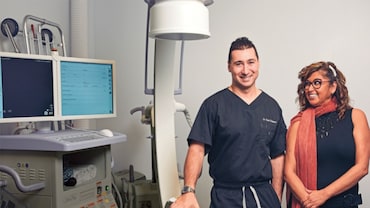Who's Getting Colon Cancer?
With rates rising among younger people, testing should start sooner
 Illustrations: Kate Traynor
Illustrations: Kate Traynor
jana Boyer was 54 in June 2021 when she and her husband travelled to Mexico to renew their wedding vows. As they were getting ready to fly home, she started experiencing stomach problems. She called her doctor, who recommended she get checked out by a gastroenterologist to see if she’d picked up a parasite from contaminated food or water.
“My sister-in-law is a retired colorectal nurse, and she’d been bugging me to get a colonoscopy since I’d turned 50,” Boyer says. “I’d kept putting it off, but I figured I might as well kill two birds with one stone.”
That colonoscopy probably saved her life. The procedure detected a mass measuring 3 centimeters in her large intestine. Further tests determined that the mass was malignant, and she immediately had surgery, followed by six months of chemotherapy. Until her trip to Mexico, Boyer hadn’t experienced any symptoms that might have been signs of colon cancer.
“Most colorectal cancers cause no symptoms in the early stage, when they are most treatable,” explains Folasade May, a gastroenterologist and an associate professor of medicine at the David Geffen School of Medicine at UCLA. “This is why starting at age 45, everyone needs to get screened for colorectal cancer, regardless of whether you have symptoms or not.” Those symptoms, when they do occur, include rectal bleeding, blood in the stool, constipation and other sudden bowel changes.
Before 2021, the recommendation was for people at average risk of colon cancer to begin screening at age 50. But because of a rising rate of the disease among younger people, the recommended age to begin is now 45. People at higher risk—those with a family history of colorectal cancer, for example—should start screening even earlier.
Last year, the American Cancer Society reported that 20 per cent of colorectal cancer cases in 2019 were in patients under age 55, about double the rate from 25 years earlier. Yet in spite of these troubling statistics, the US Department of Health and Human Services reports that fewer than 60 per cent of adults ages 45 to 75 have been screened for this disease.
Colonoscopy vs. Home Tests
The colonoscopy is considered the gold standard for colorectal cancer screening. It’s a procedure in which a small tube with a light and a lens is passed through the rectum and intestines, allowing doctors to see any growths or irregularities. If the doctor discovers polyps (small growths) in the intestines, they can be removed through
the tube. Most of these polyps are benign, but there is a risk that over time some could turn cancerous.While many people feel squeamish about the test, most who’ve had one admit it’s really not so bad. The day before the test people drink a lot of liquids, some of which include a laxative to induce diarrhoea and clean out the bowel, which will enable doctors to see the intestine walls clearly. While that might sound unpleasant, it’s mainly just inconvenient, requiring that you stay close to a bathroom until the prep is finished. Patients are sedated for the colonoscopy procedure, which is usually painless.
Still squeamish? Some people may be able to do a home test instead. The home tests aren’t recommended for anyone with a personal or family history of polyps or colon cancer. But they’re considered a good alternative for people who have no underlying risk factors and who are unable or unwilling to have a colonoscopy.
Unfortunately, the home test is not without its ick factor, either. Several tests have been approved by the FDA; Cologuard, which requires a prescription, is one of the most well known. All require that you collect a stool sample and then mail it to a laboratory to be tested for microscopic or invisible blood—and sometimes DNA—that may indicate the presence of cancer. And if the test result is positive, then you’ll have to have a colonoscopy anyway.
Researchers are still trying to develop even easier (and less icky) ways to detect colon cancer while it’s still early. While there is a blood test available to test for colon cancer, it is not as accurate as the tests described above. But recently researchers announced that a new blood test still under development can detect genetic material that tumours shed into the bloodstream. In a trial of almost 8,000 people, the new test accurately detected early colon cancer almost 90 per cent of the time.
Jana Boyer’s cancer is in remission now, but she’ll continue to be carefully monitored. She says she is grateful for many things these days, including the opportunity to share her story with others and spread the message about the importance of colon cancer screening.
“After you read this,” she says, “reach out to your doctor to see whether you should be screened.”






